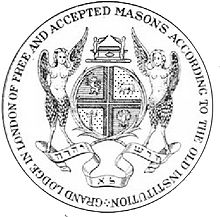| Part of a series on |
| Freemasonry |
|---|
 |

The Ancient Grand Lodge of England, as it is known today, or The Grand Lodge of the Most Ancient and Honourable Fraternity of Free and Accepted Masons (according to the Old Constitutions granted by His Royal Highness Prince Edwin, at York, Anno Domini nine hundred and twenty six, and in the year of Masonry four thousand nine hundred and twenty six) as they described themselves on their warrants,[2] was a rival Grand Lodge to the Premier Grand Lodge of England. It existed from 1751 until 1813 when the United Grand Lodge of England was created from the two Grand Lodges. They are now called the Antients, in contrast to the Moderns, the original Grand Lodge which its critics, notably Laurence Dermott, said had moved away from the ritual of Scotland, Ireland, and now the Antient Grand Lodge. This Grand Lodge was also informally called the Atholl Grand Lodge because the Third and Fourth Dukes of Atholl presided over it as Grand Masters for half of its 62-year existence.[3]
The Antients were founded on the same religious and class tensions that underpinned Methodism's success in challenging the Church of England. In addition, the Antient Grand Lodge forged closer links than the Premier Grand Lodge with the Grand Lodges of Scotland and Ireland, and the sought to recruit members from the lower classes in the English provinces unlike the more metropolitan and elite Premier Grand Lodge. The Premier Grand Lodge was Whig and rationalist, while the Antient Grand Lodge has been seen reflecting counter-enlightenment tendencies.[4]
Although the Grand Lodge never spelled Antient with a "t", the convention was followed by the Moderns, and continues to be used by United Grand Lodge. Some confusion arises from the Ancients' own documentation. Their seals are inscribed Grand Lodge in London of Free and Accepted Masons According to the Old Institution(s), while in their masonic certificates, issued to new members, they called themselves the Grand Lodge of Free and Accepted Masons of England according to the Old Constitutions.[5]
- ^ "Some Sephardic Jews in Freemasonry". Leon Zeldis. 9 October 2008.
- ^ J. Brown, Masonry in Wigan, Platt 1882
- ^ Grand Lodge of British Columbia and Yukon The Formation of the Grand Lodge of the Antients, I. R. Clarke, Ars Quatuor Coronatorum, vol 79 (1966), p. 270–73, retrieved 16 September 2012
- ^ Prescott, Andrew. "A History of British Freemasonry 1425-2000" (PDF). Retrieved 24 March 2024.
- ^ J. Ramsden Riley, Masonic Certificates, Quatuor Coronati Antigrapha, Vol VIII, 1891